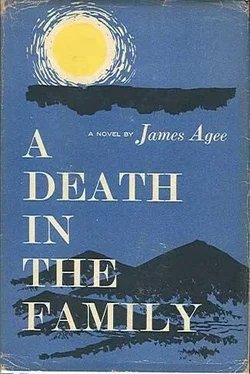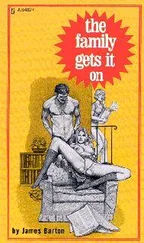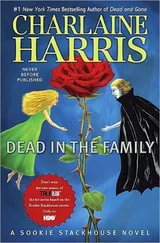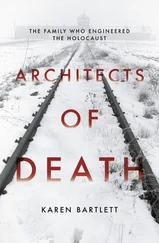When he had stopped the car in front of his home, he said, before he moved to get out, "Maybe you'd better not say anything about this." He still did not move to get out, so they too sat still. After a little he said, "No, you do as you think best." He did not look at them; he had not looked at them during all of this time. They watched the shadows work, and the leaves waving.
He got out of the car, and opened the door on their side, and held out his hands to Catherine.
"Up she goes," he said.
The house echoed, and there was still an extraordinary fragrance of carnations.
Their mother was in the East Room.
"My darlings," she said; she looked as if she had traveled a great distance, and now they knew that everything had changed. They put their heads against her, still knowing that nothing would ever be the same again, and she caught them so close they could smell her, and they loved her, but it made no difference.
She could not say anything, and neither could they; they began to realize that she was silently praying, and now instead of love for her they felt sadness, and politely waited for her to finish.
"Now we'll stay here at Granma's," she finally said. "Tonight, anyway." And again there was nothing further that she could say.
Her hands on them began to feel merely heavy. Rufus moved nearer, trying to recover the lost tenderness; at the same moment Catherine pulled away.
He understands, their mother thought; and tried not to feel hurt by Catherine's restiveness. Catherine, aware at this absolute moment that her brother was preferred, was hurt so bitterly that her mother felt it in her body, and lightened her hold, at just the moment when Catherine most desired to be taken close in to her kindness. By the way she held him Rufus realized, she thinks I'm better than I am; he felt as if he had been believed in a lie, but this time it was not a good feeling.
"God bless my children," she whispered. "God bless and keep us all."
"Amen," Rufus whispered courteously; he tried to lose his uneasiness by holding her still more closely, and felt her still more passionate hand; while Catherine, in an enchantment of pain and loneliness, stayed like a stone.
There they stayed quiet, the deceived mother, the false son, the fatally wounded daughter; it was thus that Andrew found them and, with a glimpse of the noble painting it could be, said to himself, crying within himself, "It beats the Holy Family."
"Come for a walk with me," Andrew said; from the front porch Catherine watched them until she could no longer see them. Then she pulled one of the chairs away from the wall and sat in it and rocked. She had a feeling that it would be all right to rock if she could rock without making any noise, and it interested her to try. But no matter how carefully and quietly she moved, the rockers gave out a cobbling noise on the boards of the porch, and the chair squeaked gently. She stopped rocking, less because she felt that the noise was wrong, than because she felt that she did not want to be heard. She sat with her arms and hands high and straight along the arms of the chair and looked through the railing at the lawn and down into the street. A robin hopped heavily along the grass. He gave her a short, hard look, then a second, short and hard as the jab of a needle, then paid her no further attention, but hopped, heavily, and jabbed and jabbed in the short grass with jabs which were much like his short, hard way of looking.
Down across the street she saw Dr. Dekalb come along the sidewalk towards home; he was still in his dark clothes. Remembering how her father always saw her from a distance and waved, she waited for the moment when he would look over and wave, but he did not wave, or even look over; he went straight into his house.
Deep in the side yard among her flowers she saw Mrs. Dekalb in a long, white dress and long, white gloves, wearing a paper bag on her head. She bent deeply above the flowers, rather than squatting, and whenever she moved to another place, she straightened, tall and very thin, and gathered her skirt in one hand and delicately lifted it, as Grandma did when she stepped up or down from a curb. Then she would bend deeply over again, as if she were leaning over a crib to say good night.
There were quite a few people along the sidewalks, and most of them were walking in one direction, away from downtown.
On the sage-orange tree beside the porch the leaves lay along the air as lazily as if they were almost asleep, and ever so quietly moved, and lay still again.
The robin had hold of a worm; he braced his heels, walked backward, and pulled hard. It stretched like a rubber band and snapped in two; Catherine felt the snapping in her stomach. He quickly gobbled what he had and, darting his beak even more quickly, took hold of the rest and pulled again. It stretched but did not break, and then all came loose from the ground; she could see it twisting as he flew away with it. He flung himself upward in a great curve among the branches of a tree in the side yard, and Catherine could just hear the thin hissing cries of the little robins.
Now Dr. Dekalb stood beside his wife and they were looking at each other and talking. She was taller than he was, but he was thicker through. He had taken off his coat, and pale blue suspenders crossed on his back. Above his white shirt his neck was dark red.
All the way down the block where the next street crossed she could see that there were still other people along the walks, looking tired yet walking fast, tiny at this distance, and nearly all of these people, too, were walking away from downtown.
Uncle Gordon Dekalb came towards his house. He was still wearing his dark suit and he carried his hat in one hand. His bottom was fat and he walked like a duck. Even from here Catherine could see how choked-up and thick he looked in the face and neck, Uncle Andrew said, as if his mouth was stuffed full of hot mashed potato. He looked up and across at the house and Catherine raised her hand, but he looked quickly away again, and cut across the lawn to join his father and mother. They all three talked.
A small, sudden noise frightened Catherine; then she realized it came from the living room. There was no more sound. She got from the chair in perfect silence and stole to the window in the angle of the porch. Grandma was sitting at the piano and she had opened it; Catherine could see the keys. She sat for a long while without lifting her hands from her lap. Then she stood up and shut the piano and went into the Green Room; she was wearing her apron. But before Catherine could move from the window she came in again (she can't see this far, Catherine quickly reassured herself), looked carefully about with her near-sighted, peering look, pursed her lips, and sat down again at the piano. Now she opened the keyboard once more and curved her hands powerfully above the keys and moved her fingers, but there was no sound. Grandma can't hear very well, Catherine remembered; talk very loud. So she can't hear very well when she plays music, either. She was bent way over, with her good ear close to the keys, the way she always was when she played, and her feet were working the pedals, yet she couldn't hear a sound.
But why can't I hear? Catherine suddenly thought. I always do. She watched and listened much more sharply: not one sound.
With sudden pleasure, Catherine thought of listening through a large black ear trumpet, then she realized that she was still hearing the shuffling street and the murmurous city, and knew why she could hear no music. Grandma was just making the notes go down without making any noise.
Then, close beside Catherine, her grandfather came through the door, and stopped abruptly. He was looking at Grandma. He couldn't hear very well either, but he could hear better than Grandma could; he always sat at this far end of the room when there was music. So he knew too. After he had stood a few moments he walked quickly down almost to where she sat with her back to him and both of his hands lifted above her as if he were going to touch her humped-over shoulders or her hair. Then after standing for a moment again, he turned away and walked even more quickly and quietly out by the way he had come in, and his face was so tucked down that Catherine was sure she had not been seen.
Читать дальше












